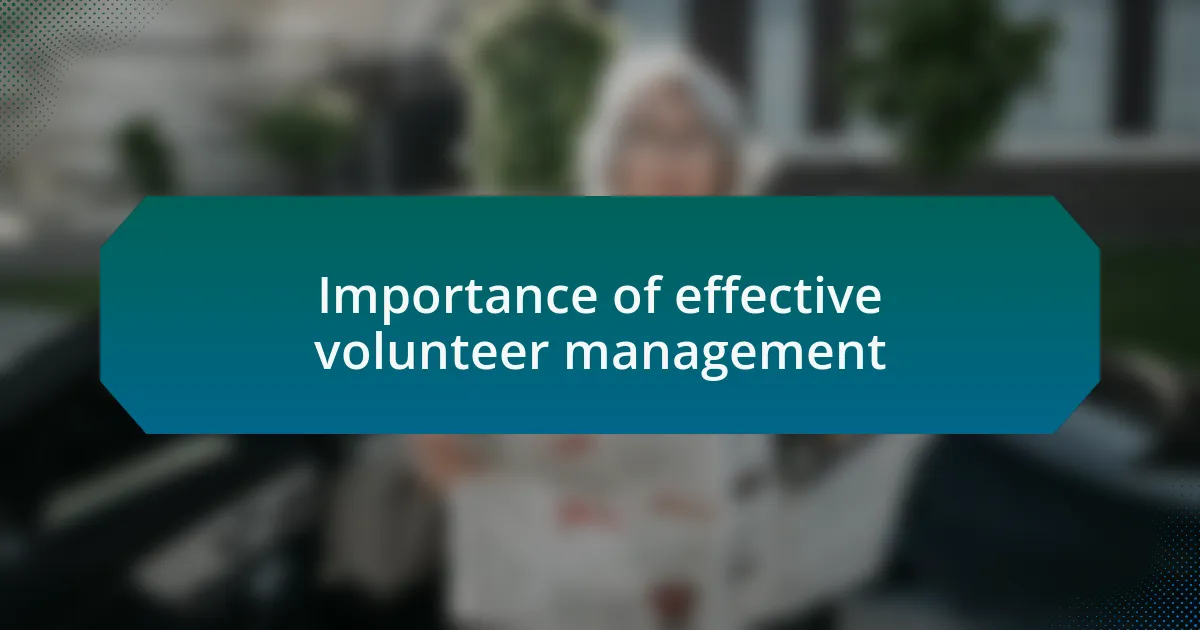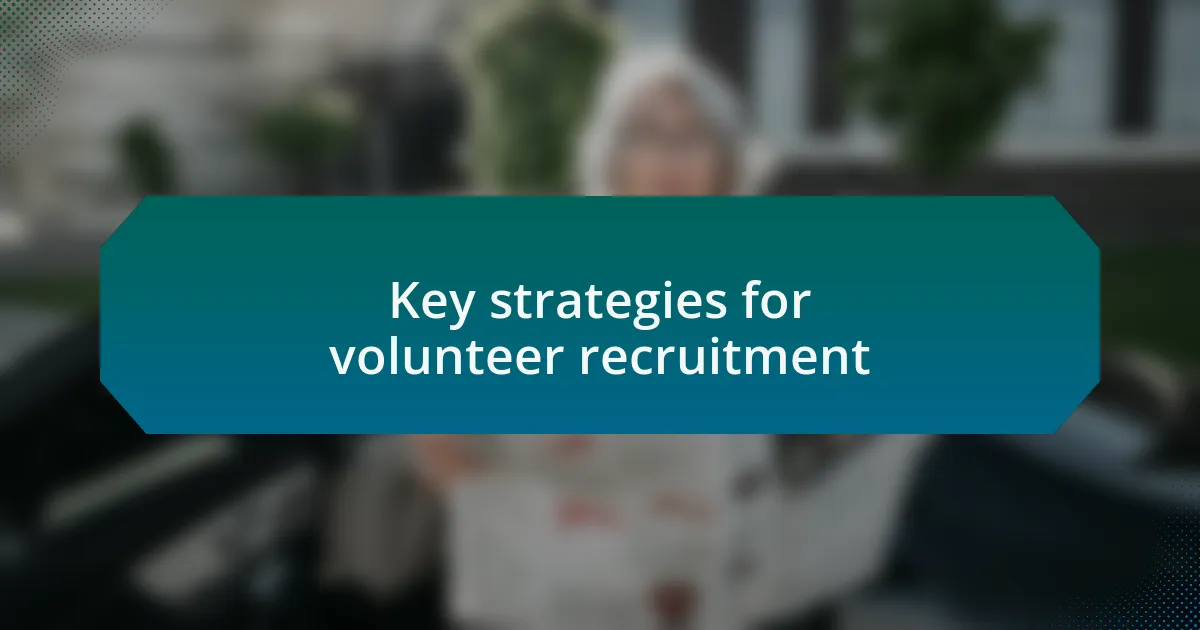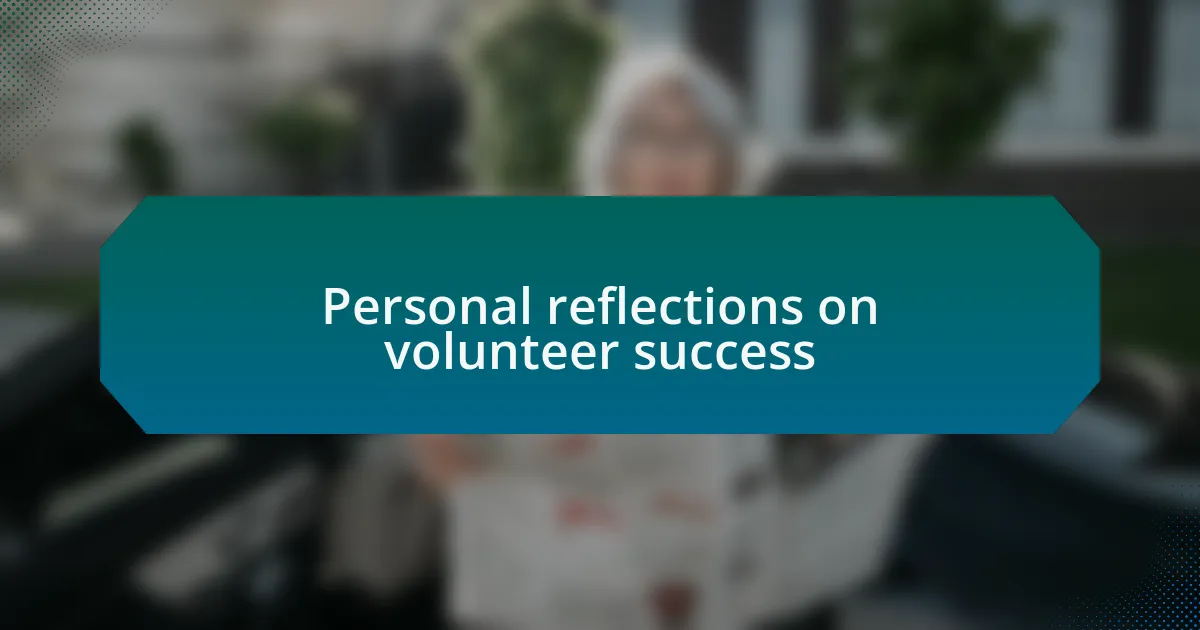Key takeaways:
- Understanding luxury car sales involves recognizing the emotional and aspirational connections buyers have with vehicles, emphasizing the importance of personal stories and experiences in the sales process.
- Effective volunteer management hinges on clear communication, appreciation, leadership, and creating a positive environment to boost morale and productivity.
- Motivating volunteers through recognition, shared success stories, and achievable goals enhances engagement and fosters a sense of belonging within the team.
- Measuring volunteer performance through feedback and metrics is vital for accountability and growth, combining quantitative data with personal experiences to create a well-rounded evaluation.

Understanding luxury car sales
Understanding luxury car sales is not just about the cars themselves; it’s about the emotions and aspirations they evoke in buyers. I remember the first time a client walked into the dealership—wide-eyed and practically glowing with excitement. It wasn’t just a car for them; it was a symbol of achievement, a ticket to a lifestyle they dreamed about. How often do we forget that each luxury vehicle represents a personal journey and a story waiting to unfold?
The luxury car market operates differently than mainstream sales. Customers often seek not just performance, but a premium experience—something that resonates on a deeper level. I noticed this when a couple came in looking for their next vehicle. They weren’t just interested in the features of the cars; they wanted a connection, a feeling of exclusivity and personal service. It made me realize that understanding their expectations was crucial to meeting their needs.
Moreover, I’ve learned that luxury car buyers appreciate transparency and authenticity. A well-informed salesperson who can share the story behind the vehicle can significantly enhance the buying experience. One of my most memorable interactions was with a buyer who appreciated the heritage and craftsmanship of the brand. This connection transformed the sale from a mere transaction into a meaningful exchange, showing just how vital it is to genuinely understand the luxury market’s unique dynamics.

Importance of effective volunteer management
Effective volunteer management is crucial because it directly impacts the productivity and morale of your team. During my time organizing events, I discovered that clear communication and appreciation are key to keeping volunteers engaged. I remember one particular event where a simple thank-you note after a long day made all the difference—it fostered a sense of belonging and commitment among the volunteers.
Moreover, a well-structured volunteer program can transform a group of diverse individuals into a cohesive unit that works toward a common goal. I’ve experienced firsthand how strong leadership and defined roles can elevate an initiative. When I implemented a buddy system during a major car show, not only did it enhance collaboration, but it also turned a daunting task into a fun experience that everyone looked forward to.
Ultimately, the significance of fostering a positive environment cannot be overstated. It’s not just about getting the job done; it’s about creating an experience that fuels passion and dedication. I’ve witnessed volunteers go above and beyond when they felt valued—a dynamic that sparked creativity and fostered a shared sense of purpose. How often do you see that drive making a real difference in the outcome of an event? From my perspective, it’s transformative.

Key strategies for volunteer recruitment
Attracting the right volunteers begins with crafting a clear and compelling message about your mission. I’ve found that sharing personal stories related to the cause can ignite interest. For instance, when I shared how a previous event impacted the local community, several volunteers told me they felt an emotional connection, which motivated them to join. Can you imagine how powerful it is to have recruits who are already invested in your vision?
Another effective strategy is utilizing social media platforms to reach a broader audience. In my experience, showcasing behind-the-scenes moments from past events not only piques curiosity but also humanizes the organization. I remember posting candid photos of volunteers enjoying their work, which directly led to an influx of inquiries from potential recruits. How can you leverage your online presence to create buzz?
Lastly, tapping into existing networks can yield surprising results. I found success by reaching out to local car enthusiast clubs; many members were eager to lend their expertise. Engaging with groups that share an interest in the luxury automotive sector helped me cultivate dedicated volunteers who truly understood our goals. Have you considered where else you might find passionate individuals ready to contribute?

Training volunteers for car sales
Training volunteers in car sales is an opportunity to transform enthusiastic individuals into knowledgeable advocates for luxury vehicles. When I first conducted a training session, I focused on not just the technical specifications of the cars, but also on the luxury lifestyle they represent. I encouraged volunteers to immerse themselves in the brand stories behind each vehicle, creating authentic connections that resonate with potential customers.
I’ve learned that hands-on practice is invaluable. During one training, I arranged for volunteers to shadow experienced salespeople during a weekend event. This not only equipped them with practical skills but also allowed them to witness the nuances of customer interaction. It’s fascinating to see how much confidence can grow from just a few days of real-world experience—don’t you think that direct involvement forms the foundation of effective selling?
Additionally, creating an environment that fosters open communication is crucial. I often invite volunteers to share their thoughts after each training session, and it’s remarkable how these discussions lead to actionable insights. Asking for their feedback not only empowers them but also taps into a unique perspective that can refine our approach. How often do you seek input from your own team to enhance training outcomes?

Motivating volunteers in sales
Motivating volunteers in sales is all about making them feel valued and connected to the mission. I remember a time when I organized a special recognition event just for our volunteers. Celebrating their contributions, even if they seemed small, created a palpable sense of belonging. Don’t you find that acknowledgment goes a long way in inspiring people to put their best foot forward?
In my experience, sharing success stories can significantly boost motivation. I once highlighted a volunteer who closed a sale by using their personal touch—an anecdote about a family road trip. This not only showcased the potential for genuine connections but also inspired others to think creatively about how they approach potential buyers. When volunteers see that their efforts can lead to real results, it ignites a spark of passion.
Another method I’ve found effective is setting achievable goals and celebrating the milestones along the way. During a sales campaign, we set weekly targets and recognized those who consistently hit them. I vividly recall how one volunteer, initially hesitant, gained confidence and enthusiasm as they achieved small victories. It’s those incremental wins that can make a significant difference—how do you celebrate the journey with your team?

Measuring volunteer performance
Measuring volunteer performance is crucial in maintaining a motivated and efficient team. I remember when I implemented a simple feedback system where volunteers could evaluate each other’s contributions. This not only fostered a sense of accountability but also sparked insightful conversations about strengths and areas for improvement. Have you ever thought about how peer assessments can elevate performance with a culture of mutual respect and growth?
Tracking specific metrics can give a robust view of how volunteers are performing in sales. For instance, I started analyzing metrics like the number of leads generated and sales closed, which helped identify high performers. Once, I noted a volunteer who consistently exceeded their targets; recognizing their strategies enabled others to learn and adapt as well. It’s fascinating how data can illuminate paths for collaboration and shared success, don’t you think?
I’ve realized that performance conversations shouldn’t just be about numbers; they also need to consider the volunteers’ personal experiences. During a quarterly review, I opened up about my own challenges in the field, which encouraged others to share their stories too. This emotional connection transformed our discussions into productive dialogues where feelings, motivations, and results were equally valued. How do you balance the metrics with the human elements of volunteer engagement?

Personal reflections on volunteer success
Reflecting on moments of success with volunteers, I often think about our first big charity event. I remember standing amid the hustle and bustle, watching our volunteers energize the crowd with their passion. It struck me how their enthusiasm not only engaged potential buyers but also created a sense of camaraderie among them. Have you noticed how shared purpose can elevate the performance of a team?
Another experience I value was when a quieter volunteer took the lead on a project that seemed daunting to many. I observed how stepping into the spotlight transformed their demeanor, revealing strengths that had previously gone unnoticed. It’s incredible to witness how opportunity can nurture emerging leaders, isn’t it? I find that recognizing these moments of individual success helps to build a thriving environment where everyone feels empowered.
Lastly, I cannot overlook the importance of celebration—both small and large victories. I recall organizing a simple thank-you gathering after our biggest campaign, where volunteers took turns sharing their proudest moments. The genuine joy in those reflections deepened our connections and reinforced a culture of appreciation. How meaningful do you think it is to acknowledge effort to foster a sense of belonging among volunteers?